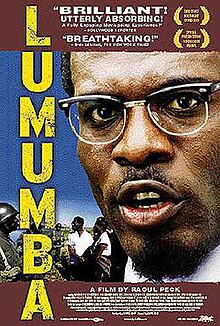Lumumba (film)
| Lumumba | |
|---|---|
 |
|
| Directed by | Raoul Peck |
| Produced by | Jacques Bidou, Raoul Peck |
| Written by | Pascal Bonitzer, Dan Edelstein, Raoul Peck |
| Starring | Eriq Ebouaney |
| Music by | Jean-Claude Petit |
| Cinematography | Bernard Lutic |
| Edited by | Jacques Comets |
|
Release date
|
|
| Country |
France Belgium Germany Haiti |
Lumumba is a 2000 film directed by Raoul Peck centred on Patrice Lumumba in the months before and after the Republic of the Congo (Congo-Léopoldville) achieved independence from Belgium in June 1960. Raoul Peck's film is a coproduction of France, Belgium, Germany, and Haiti. Political unrest in the Democratic Republic of the Congo at the time of filming caused the film to be shot in Zimbabwe and Beira, Mozambique.
The plot is based on the final months of Lumumba (played by Eriq Ebouaney) the first prime minister of the Congo, whose tenure in office lasted two months, until he was driven from office. Joseph Kasa-Vubu (Maka Kotto) is sworn in, alongside Lumumba, as the first president of the country, and together, they attempt to prevent the Congo succumbing to secession and anarchy. The film concludes with Joseph Mobutu (Alex Descas) seizing power.
The film premiered at the 2000 Cannes Film Festival on 14 May 2000, and it was shown at various film festivals as well as having commercial releases in Belgium, France, Switzerland, the United States and Canada. The film grossed $684,000 in the US. It also aired on HBO.
Reviewing the film in The Guardian, Alex Tunzelmann noted Peck's "commendable effort to get as close to the truth as possible, incorporating many details from historical investigator Ludo de Witte's The Assassination of Lumumba. Tunzelmann suggested the film might move too quickly through the Congo and Lumumba's history for viewers not already familiar with it to keep up, but said the "last part of the film, from Lumumba's falling out with Mobutu to his death, is gripping to watch, building to a superb last scene intercutting Lumumba's fate with Mobutu's attempt to rewrite history." Writing for The New York Times, Elvis Mitchell read the film's pace as "refus[ing] to lay out Lumumba's life in traditional, corny terms by presenting a lengthy and unwieldy history lesson and then groveling for audience sympathy. Instead Lumumba vaults through his radicalization and the track that led this former civil servant and beer salesman to leave his angry stamp on the world."
...
Wikipedia
